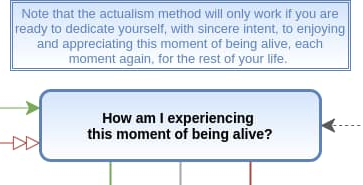@henryyyyyyyyyy wrote recently:
This was a great reminder. I had sunk back into old habits of constantly investigating, whilst not feeling good!
A few things immediately stood out for me that I thought would be helpful to share (besides the experience in and of itself of having forgotten this yet again & remembering it):
-
There is certainly a skill or a knack to feeling good. I find it a lot easier to get to feeling good now than I did years ago. And this skill or knack doesn’t have anything to do with successful investigation, it’s like an emotional skill and/or an existential sensing of pure intent that can bring about the quality of feeling good and point me in the right direction.
-
The entire point is that feeling good is primary, everything else is secondary. So the mistake is to believe that one has to investigate, and then that somehow at the end of the investigation one will magically feel good.
Rather it’s the other way around. I feel good first. I get back to feeling good if I’m not. And if I find myself repeatedly not feeling good over the same issue… then it means that an investigation is necessary / helpful. So the investigation is motivated by the experiential necessity of it from having witnessed that issue strike again… rather than investigation being in and of itself a method to get back to feeling good.
With that being said I’ve noticed that sometimes investigation ‘works’ – there is a clear insight and an amazing experience of that issue vanishing, which clears the way to feeling good… and other times it doesn’t, spinning in circles. I can’t say this for sure now but I suspect that it ‘works’ when done out of necessity (as described above), and doesn’t work when done as an end in-and-of-itself.
-
It became immediately apparent that ‘I’ don’t have to ‘be’ anything or anyone or ‘do’ anything special to feel good. And what’s more, anything ‘I’ accomplish or achieve or attain or any ‘person’ that ‘I’ become, doesn’t matter at all for feeling good. So in order to be able to do this sincerely this has to be accepted. I think this is why so many people miss the point of feeling good (including me forgetting from time to time) - because ‘I’ have to be willing to abandon ‘who’ I am , and to see it was all for vain.
-
I also got a sense while falling asleep that this is really a fundamental shift in human consciousness. I saw it like the way human consciousness basically works now, as a feeling-being, is that while the natural/sensible thing to do is to enjoy and feel good, what we do is we pervert this, we flip it, and introduce a ‘condition’ that must then be ‘satisfied’ before we allow ourselves to feel good.
So we delay feeling good until after some thing is done. But then, we have it ingrained in us that we need some sort of purpose, so just as we would be about to get that reward of feeling good, we pervert it again, introduce another condition, etc…
And this is just the way most people live their lives. Never, or rarely, actually getting to that feel-good reward. And then feeling bad if we feel good for too long, because we lost our motivation/drive/momentum or whatever.
This undoubtedly causes a lot of productivity… but at what cost, and to what end?
-
In short I can see why this might have evolved (either genetically or culturally or both) because, without sensible intelligence, if there is no drive or motive or force we wouldn’t do anything, and then we’d starve. So all the non-instinctually-motivated phenotypes didn’t reproduce, died out, were out-competed by the instinctually-motivated ones.
But now humans are intelligent enough as a species that if we only would allow this intelligence to operate unimpeded, everything that needed to get done would get done, and there would be enjoyment and appreciation throughout.
That being said this all comes from me who is someone that is very driven in life. For someone that is perhaps instinctually unmotivated, they may have a different experience. Or maybe they are instinctually motivated but it’s just not funneled in ways society would call ‘productive’. It must require a lot of motivation in one sense, to play video games non-stop ![]() . But I’m speaking of hypotheticals, I would be interested in reading such a person’s experience with all this.
. But I’m speaking of hypotheticals, I would be interested in reading such a person’s experience with all this.
